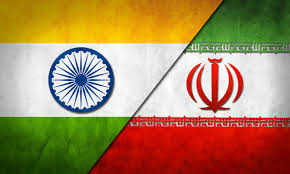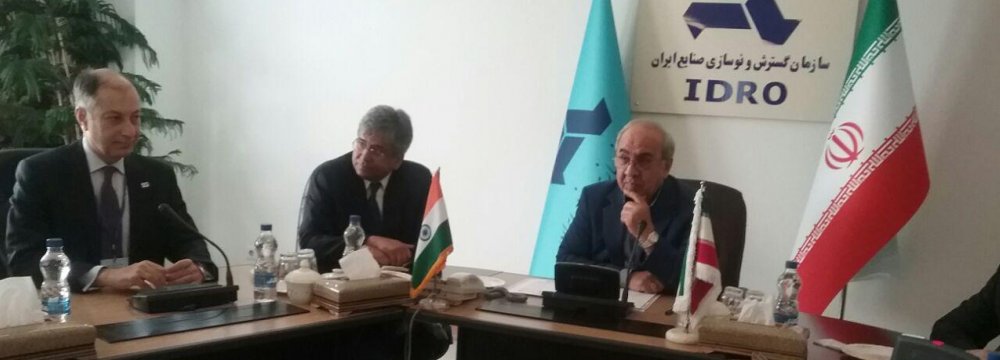
India to Finance Rolling Stock Manufacturing Company in Iran

The agreement was signed in Tehran on Wednesday in the presence of IDRO's Chairman Mansour Moazzami, who is also a deputy minister of industries, and Indian Ambassador to Iran Saurabh Kumar who was accompanied by an Indian business delegation, IRNA reported.

"IDRO aims to boost the presence of Indian companies in Iran, and reciprocally that of Iranian companies and industry players in India," said Moazzami, adding that the removal of international nuclear sanctions against Iran has paved the way for Iran and India to increase their industrial cooperation more than ever.
Noting that the rolling stock manufacturing company is to be constructed in an underdeveloped area of Iran, the deputy minister said the details of the agreement will be announced in the future.
Late July, IDRO signed a €2.5 billion contract with Russia’s CJSC Transmashholding for joint production of rolling stock in Iran.
Based on the contract, a joint venture will be formed between IDRO and the Russian company with the Russian side holding an 80% stake and the Iranian side a 20%.
CCI Opens Tehran Office
The Confederation of Indian Industry opened an office in Tehran on Tuesday, according to Saurabh Kumar.
“CII has around 8,000 member companies, which have in turn 200,000 subsidiary companies working under them. The opening of Tehran office indicates these companies’ willingness to expand their cooperation with their Iranian counterparts,” he was quoted as saying by IRNA.
The envoy added that the confederation has chosen IDRO as the threshold to Iran’s industrial sector and is planning to cooperate in projects and mega-projects carried out by IDRO.
IDRO was established in 1967 and has evolved into one of the largest conglomerates in Asia. The organization's objective is to develop Iran's industrial sector and accelerate the industrialization process of the country and to export Iranian products.
It owns more than 100 subsidiaries and affiliated companies both domestically as well as internationally.
Iran’s non-oil exports to India, mainly including chemicals and petrochemicals, tar, nuts, dates and a small amount of fruit, stood at around $2.8 billion in 2016, Tehran Chamber of Commerce, Industries, Mines and Agriculture's news portal reported.
Imports from India, which mainly consisted of rice, auto parts, machinery, steel, pharmaceuticals, rubber and tea, stood at $1.9 billion during the same period.


Trump weighs using $2 billion in CHIPS Act funding for critical minerals

Codelco cuts 2025 copper forecast after El Teniente mine collapse

Electra converts debt, launches $30M raise to jumpstart stalled cobalt refinery

Abcourt readies Sleeping Giant mill to pour first gold since 2014

Barrick’s Reko Diq in line for $410M ADB backing

Nevada army depot to serve as base for first US strategic minerals stockpile

Tailings could meet much of US critical mineral demand – study

Viridis unveils 200Mt initial reserve for Brazil rare earth project

SQM boosts lithium supply plans as prices flick higher

Energy Fuels soars on Vulcan Elements partnership

Northern Dynasty sticks to proposal in battle to lift Pebble mine veto

Giustra-backed mining firm teams up with informal miners in Colombia

Critical Metals signs agreement to supply rare earth to US government-funded facility

China extends rare earth controls to imported material

Galan Lithium proceeds with $13M financing for Argentina project

Silver price touches $39 as market weighs rate cut outlook

First Quantum drops plan to sell stakes in Zambia copper mines

Ivanhoe advances Kamoa dewatering plan, plans forecasts

Texas factory gives Chinese copper firm an edge in tariff war

Energy Fuels soars on Vulcan Elements partnership

Northern Dynasty sticks to proposal in battle to lift Pebble mine veto

Giustra-backed mining firm teams up with informal miners in Colombia

Critical Metals signs agreement to supply rare earth to US government-funded facility

China extends rare earth controls to imported material

Galan Lithium proceeds with $13M financing for Argentina project

Silver price touches $39 as market weighs rate cut outlook

First Quantum drops plan to sell stakes in Zambia copper mines

Ivanhoe advances Kamoa dewatering plan, plans forecasts

















